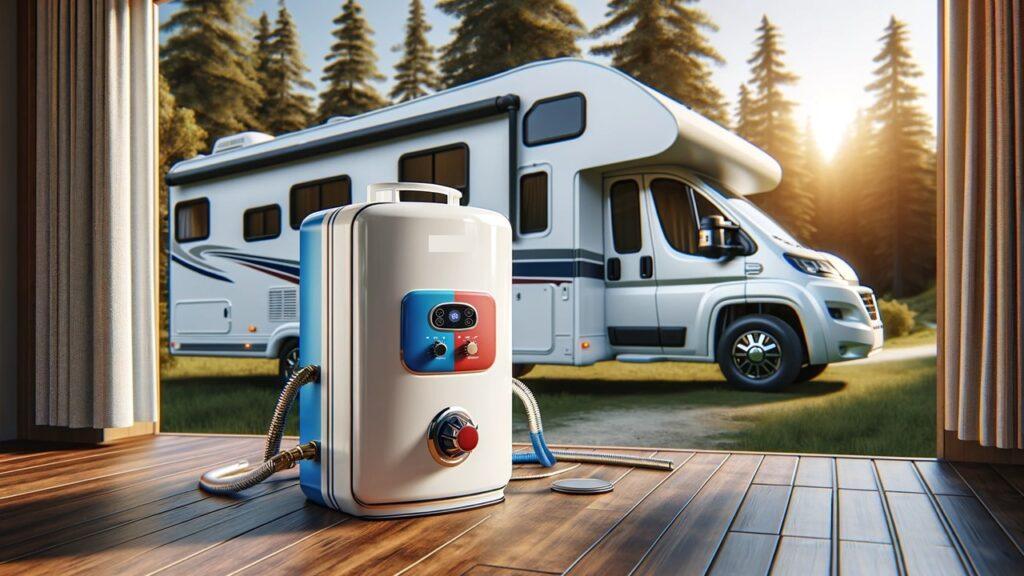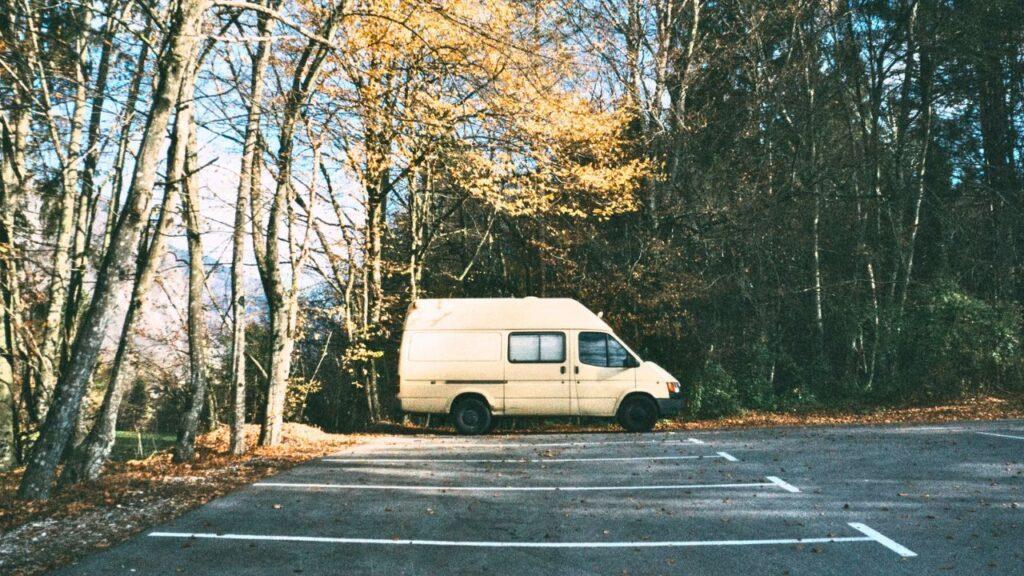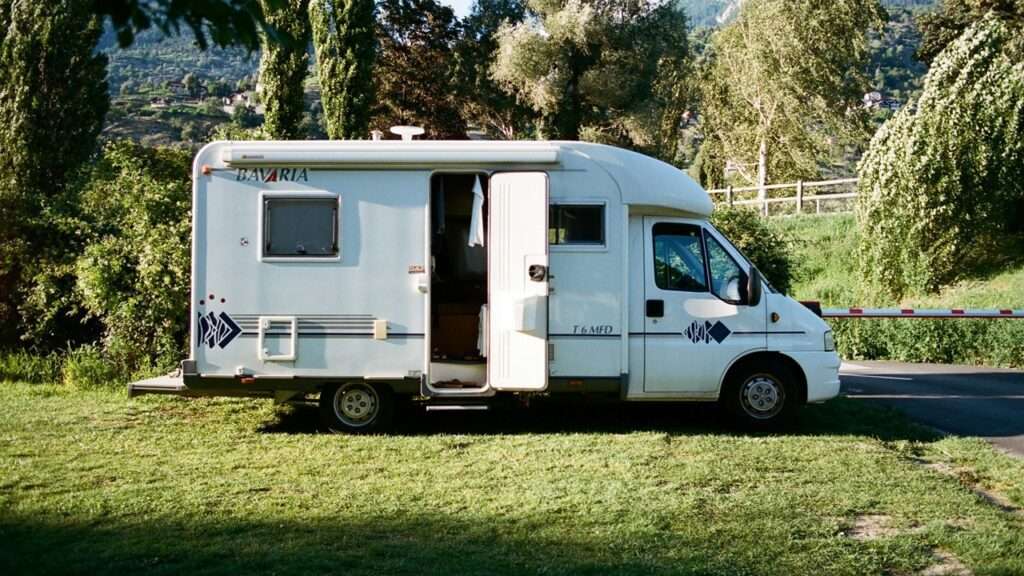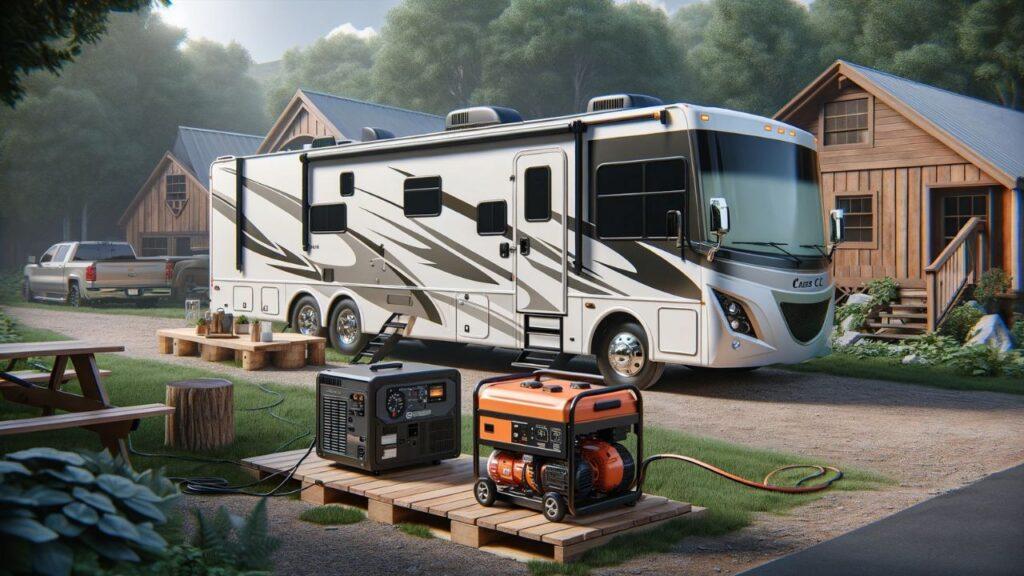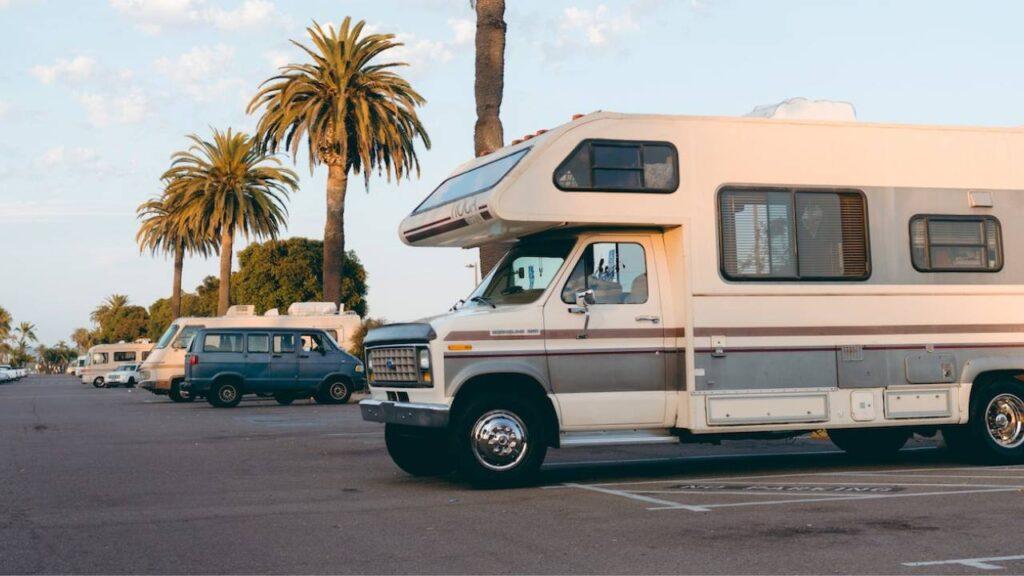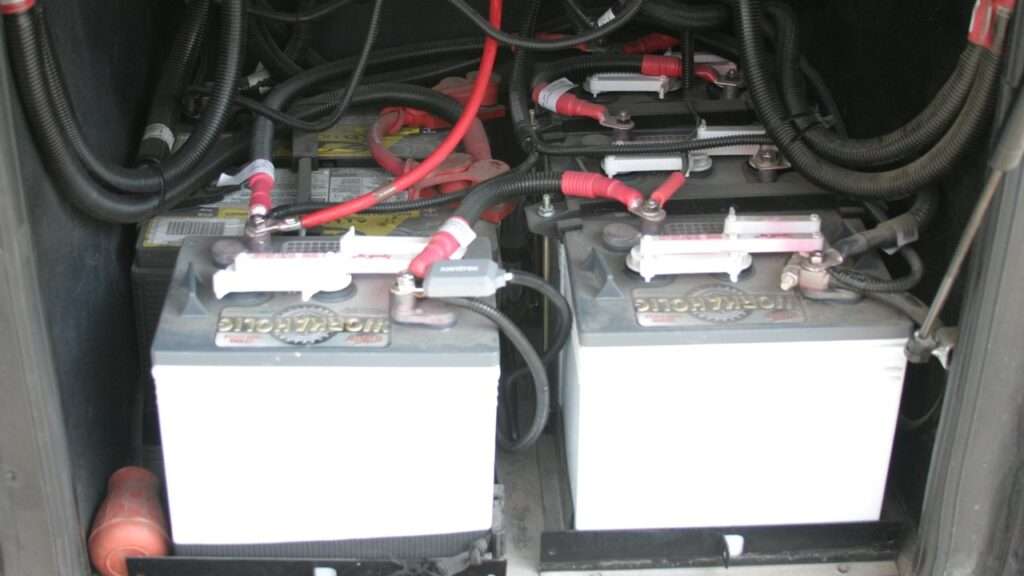The best generators for camper van life are quiet, compact, and fuel-efficient, ideal for 1000 to 3000 watts of portable power. Designed to run 12V systems, charge batteries, and power essentials like fridges, fans, and lights, these generators are perfect for off-grid or campground use. We’ve reviewed the top models based on wattage, fuel type, noise level, and real-world performance to help you choose the best fit for your van setup.
We’re reader-supported. When you buy through links on our site, we may earn an affiliate commission. As an Amazon Associate, we earn from qualifying purchases, at no extra cost to you.
Best Generators for Van Life: Our Top 10 Picks
- Best Overall Option: Honda EU2200ITAN 2200-Watt
- Value for Money Option: WEN 3600-Watt Portable Inverter Generator
- Best Budget Friendly Option: PowerSmart 2500-Watt
- Solar Generator Option: EF ECOFLOW Portable Power Station DELTA 2
- Quiet Operation Option: YAMAHA EF2200iS Inverter Generator
- Lightweight Option: Champion Power Equipment 2500-Watt
- Dual Fuel Option: Westinghouse 2550 Peak Watt
- Heavy-Duty Option: Generac 3,300-Watt Gas-Powered Portable Inverter Generator
- Handheld Solar Option: Jackery Portable Power Station Explorer 500
- Fuel Shutoff Option: WEN 2350-Watt Inverter Generator (56235i)
1. Best Overall Option: Honda EU2200ITAN 2200-Watt

Quick Specifications
- Brand: Honda
- Wattage: 2200 watts
- Fuel Type: Gasoline
- Weight: 46.5 Pounds
- Voltage: 120 Volts
- Dimensions: 20″L x 11.4″W x 16.7″H
- Tank Volume: 0.95 Gallons
Ever been deep in the woods, craving a hot cup of coffee, and thought, “I wish I had a reliable generator right now”? Enter the Honda EU2200iTAN Inverter Generator. This isn’t just another generator; it’s like that trusty friend who always has a solution up their sleeve. With a beefy 2200 watts, it’s got more than enough oomph to power up your campsite. And, let’s be honest, who wouldn’t want a generator that thinks about your safety? The CO-MINDER system is like a guardian angel, always on the lookout for sneaky carbon monoxide levels.
But wait, there’s more. If you’re the kind who likes to keep tabs on things from your cozy hammock, the Honda My Generator App is your new good friend. With a tap or two on your phone, you’re in control, thanks to its Bluetooth capability. And for those who dread the thought of lugging around a hefty generator, this one’s a featherweight at just over 47 pounds. Plus, with the heart of a Honda GXR120 engine beating inside, you know it’s built to
Pros
- Powerful 2200-watt output with a Honda GXR120 engine.
- Safety-first with the CO-MINDER system monitoring carbon monoxide levels.
- Remote operation and monitoring with the Honda My Generator App.
- Compact, lightweight design for easy portability.
Cons
- Exclusively uses gasoline, limiting fuel flexibility.
- Premium features might come with a premium price tag for some.
The Honda EU2200iTAN Inverter Generator combines performance, innovation, and safety to provide more than just power. It is designed with the modern traveler in mind, so you may appreciate the unadulterated beauty of nature without giving up the conveniences and security of contemporary living.
2. Value for Money Option: WEN 3600-Watt Portable Inverter Generator
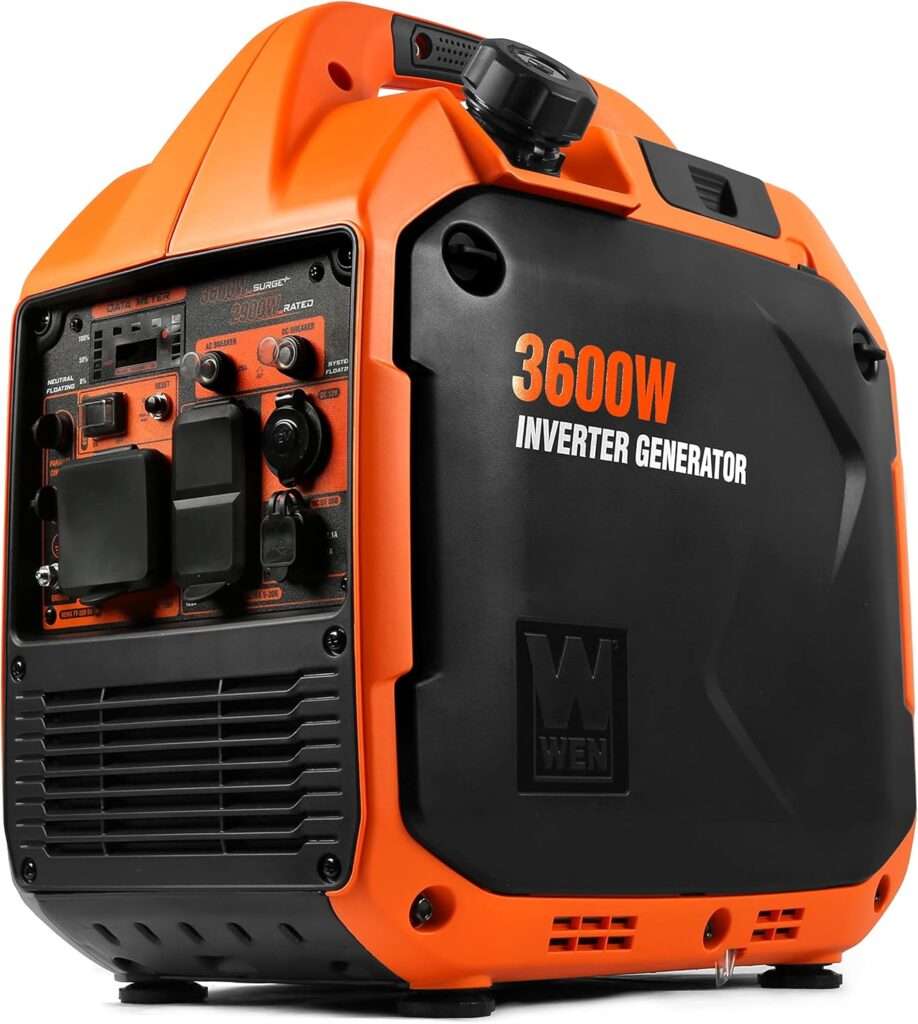
Quick Specifications
- Brand: WEN
- Starting Wattage: 3600 watts
- Running Wattage: 2900 watts
- Fuel Type: Gasoline
- Weight: 46.3 pounds
- Voltage: 120 Volts
- Dimensions: 17.9″L x 11.6″W x 19.7″H
- Fuel Tank Capacity: 1.6 gallons
Alright, so if you’re looking for a generator that won’t break the bank but still does the job, the WEN 3600-Watt Inverter Generator is something to consider. It’s light enough to carry without feeling like you’re hauling bricks and it’s quieter than most in this range. That’s a big plus when you’re camping or parked in an RV park where nobody wants to hear a generator roaring all night. From our standpoint, it’s simple and effective, does what it says, and doesn’t come with any unnecessary complications.
One of the things we like is that it produces clean power, which means it won’t mess up sensitive electronics like laptops, phones, and tablets. The fuel shutoff feature is handy too, burning out leftover fuel before shutting down so the carburetor doesn’t get gunked up. It’s got a decent number of outlets, including an RV-ready TT-30R outlet, USB ports, and a 12V DC plug, making it useful for different setups. The eco-mode is another solid feature, helping to stretch fuel a bit longer when the power demand isn’t too high. Overall, it’s a straightforward, reliable option for those who need power on the go without spending a fortune.
Appliance Compatibility & Estimated Runtime
Below are some of the appliances operated using the WEN 3600-Watt Portable Inverter Generator (56360i), along with their starting and running wattages.
| Appliance | Starting Wattage | Running Wattage | Estimated Runtime |
| Mini Fridge | 600W | 200W | 10-12 hours |
| Coffee Maker | 1000W | 800W | 3-4 hours |
| Microwave | 1000W | 1000W | 3-4 hours |
| Laptop & Phone | 0W | 100W | 20+ hours |
| LED Lights (Set) | 0W | 50W | 25+ hours |
| RV Air Conditioner | 1800W | 1300W | 2-3 hours |
Pros
- Lightweight and easy to carry at 46 pounds
- Runs quieter than most similar generators
- Fuel shutoff feature helps prevent maintenance issues
- RV-ready outlet means no extra adapters needed
Cons
- Five-hour runtime at half load means you might need to refuel overnight
- Gasoline-only operation, so no dual-fuel flexibility
From our perspective, the WEN 3600-Watt Portable Inverter Generator is a solid option for those who want something reliable without spending a ton. It’s quiet enough to not be annoying, light enough to move without straining your back, and has enough power to run the essentials. The fuel shutoff and eco-mode features are nice touches that help with efficiency and maintenance. It’s not the biggest or most powerful, but if you need an efficient, easy-to-use generator for van life, RVing, or outdoor trips, this one makes a lot of sense.
3. Best Budget-Friendly Option: PowerSmart 2500-Watt
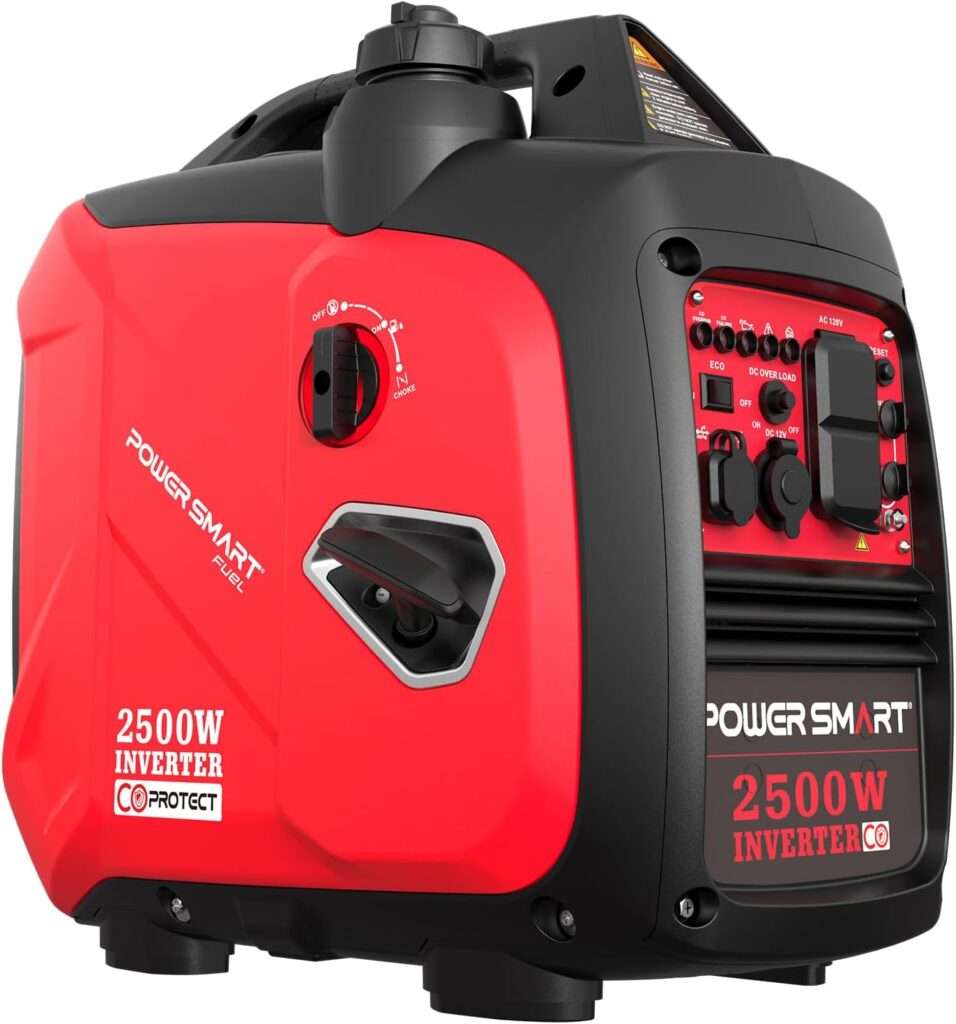
Quick Specifications
- Brand: PowerSmart
- Starting Wattage: 2500 watts
- Running Wattage: 1900 watts
- Fuel Type: Gas
- Weight: 39 pounds
- Voltage: 120 Volts
- Dimensions: 19.1″L x 13.4″W x 20.1″H
- Fuel Tank Capacity: 1.05 gallons
In reality not everyone wants to spend a fortune on a generator, and if you’re looking for something that’s budget-friendly but still does the job, this PowerSmart 2500-watt generator is worth checking out. It’s small, lightweight, and portable, which is a huge plus for van life, camping, or even as a backup power option. At just 39 pounds, it’s one of those generators you can actually move around without struggling. It’s not a powerhouse, but for basic needs like keeping small appliances running, it holds up pretty well.
From our standpoint, it’s a good choice for people who need something simple. The built-in CO sensor shutoff is a nice safety feature, especially if you’re using it in tight spaces like a van or small campsite. It’s also parallel capable, so if you ever feel like you need more power, you can hook up a second unit and double the output. Noise-wise, it runs at around 69 dB from 23 feet away, which is decent for an inverter generator but not the quietest out there. Overall, for what it costs, it does a solid job without overcomplicating things.
Appliance Compatibility & Estimated Runtime
Below are some of the appliances operated using the PowerSmart 2500-Watt Portable Inverter Generator (PS5020W), along with their starting and running wattages.
| Appliance | Starting Wattage | Running Wattage | Estimated Runtime |
| Mini Fridge | 600W | 200W | 10-12 hours |
| Coffee Maker | 1000W | 800W | 3-4 hours |
| Microwave | 1000W | 1000W | 3-4 hours |
| Laptop & Phone | 0W | 100W | 15+ hours |
| LED Lights (Set) | 0W | 50W | 20+ hours |
| Small Heater | 1500W | 1300W | 1-2 hours |
Pros
- Lightweight and easy to move around, perfect for travel
- Runs for up to 11 hours on a 1.05-gallon tank at 25% load
- Built-in CO shutoff sensor for safety
- Parallel capability lets you double the power if needed
Cons
- Can’t handle large appliances like air conditioners for extended periods
- Gas-powered only, so no dual-fuel option for flexibility
From our perspective, this PowerSmart generator is one of those simple, no-fuss options that works well for the price. It’s not built to power an entire RV setup, but for small electronics, cooking appliances, and lighting, it’s a solid option. The lightweight design, easy portability, and safety features make it a practical choice for van life, camping, or short-term emergency use. If you’re looking for a reliable yet affordable generator without too many extras, this one makes sense.
4. Solar Generator Option: EF ECOFLOW Portable Power Station DELTA 2

Quick Specifications
- Brand: EF ECOFLOW
- Starting Wattage: 2700 watts
- Running Wattage: 1800 watts
- Fuel Type: Solar Powered
- Weight: 27 pounds
- Voltage: 120 Volts
- Dimensions: 15.7″L x 8.3″W x 11.3″H
- Capacity: 1024Wh (Expandable up to 3kWh)
- Running Time: Varies based on load and solar conditions
- Ports and Outlets: 6 AC outlets, USB-C, USB-A, DC, Car Port
For those of us looking to go completely gas-free, the EcoFlow DELTA 2 makes a lot of sense. It’s one of those solar generators that doesn’t just look sleek but actually delivers. From our standpoint, the charging speed is one of the most impressive things here. Plugging it into a wall outlet gets it from 0-80% in just 50 minutes, which is much faster than most portable power stations. Plus, it offers solar input of up to 500W, so if you have compatible panels, you can stay charged even while off-grid.
Another thing that stands out is its power capacity. With 1800W output, it can handle 90% of appliances without an issue. From small kitchen appliances to a laptop setup, it holds up well. The expandable battery capacity up to 3kWh also adds flexibility. Furthermore, since it’s built with LiFePO4 battery chemistry, it’s designed to last much longer than standard lithium-ion batteries. For van life or off-grid camping, this power station does the job without the fumes, noise, or hassle of gas-powered generators.
Appliance Compatibility & Estimated Runtime
Below are some of the appliances operated using the EF ECOFLOW Portable Power Station DELTA 2, along with their starting and running wattages.
| Appliance | Starting Wattage | Running Wattage | Estimated Runtime |
| Mini Fridge | 600W | 200W | 4-5 hours |
| Coffee Maker | 1000W | 800W | 1-2 hours |
| Microwave | 1000W | 1000W | 1-2 hours |
| Laptop & Phone | 0W | 100W | 10-12 hours |
| LED Lights (Set) | 0W | 50W | 15+ hours |
| Small Heater | 1500W | 1300W | 45 min – 1 hour |
Pros
- Charges 7x faster than most portable power stations, reaching 80% in 50 minutes
- Expandable capacity up to 3kWh, making it flexible for different power needs
- Completely silent operation with no fumes or fuel needed
- Handles most appliances, from laptops to kitchen devices, with 1800W AC output
Cons
- Solar panels sold separately, so the full off-grid experience requires extra investment
- A bit heavy at 27 pounds, though still manageable for a portable power station
From our standpoint, the EF ECOFLOW DELTA 2 is a proper solution for anyone serious about solar power for van life. It’s fast-charging, powerful, and expandable, making it one of the most practical solar options. The ability to charge through solar, AC, or car outlets also makes it flexible for different travel setups. If you’re moving toward clean energy and want something that can actually power your essentials, this is an excellent choice for your travels.
5. Quiet Operation Option: YAMAHA EF2200iS Inverter Generator

Quick Specifications
- Brand: YAMAHA
- Wattage: 2200 watts
- Fuel Type: Gasoline
- Weight: 55.2 Pounds
- Voltage: 120 Volts
- Dimensions: 21.9″L x 11.8″W x 18.5″H
There’s a certain aesthetic about the open road, the freedom of van life, and the allure of the great outdoors. But let’s be real, even the most rugged adventurers among us appreciate a touch of modern convenience. Enter the YAMAHA EF2200iS Inverter Generator. This isn’t just another piece of equipment; it’s the silent powerhouse that ensures our nights under the stars are as comfortable as they are memorable.
The heart of this generator is its robust Yamaha 79cc engine, delivering a high power output that’s both clean and reliable. And when it comes to noise? Yamaha’s got that covered. Thanks to their advanced muffler technology, this generator purrs so quietly, you might forget it’s even there. It has a user-friendly design. From the illuminated multi-function LED display to the smart dial knob, every feature is crafted to make our lives simpler. And for those of us with RVs, the standard RV outlet is a godsend, eliminating the hassle of hunting for adapters.
Pros
- Powerful and reliable Yamaha 79cc engine.
- Ultra-quiet operation, thanks to Yamaha’s sophisticated muffler technology.
- User-friendly features like the illuminated LED display and smart dial knob.
- Designed with RV campers in mind, featuring a standard RV outlet.
Cons
- At 55.2 pounds, it’s not the lightest option available, which might be a concern for those prioritizing portability.
- The 10-hour runtime is based on ¼ rated load, so heavy usage might drain it faster than expected.
Yamaha’s EF2200iS is the embodiment of power and convenience in one sleek package. From its robust engine to its whisper-quiet operation and user-centric design, it’s clear that this generator was crafted with the modern traveler in mind. It’s not just a generator; it’s our reliable companion on every adventure.. Whether you’re deep in the woods or parked by a serene lake, this generator ensures you’re never too far from home comforts.
6. Lightweight Option: Champion Power Equipment 2500-Watt

Quick Specifications
- Brand: Champion Power Equipment
- Starting Wattage: 2500 watts
- Running Wattage: 1850 watts
- Fuel Type: Gasoline
- Weight: 39.7 pounds
- Voltage: 120 Volts
- Dimensions: 17.6″L x 12.6″W x 18.1″H
- Fuel Tank Capacity: 1.1 gallons
For those who need something easy to carry, this Champion 2500-watt inverter generator is a solid pick. From our standpoint, the lightweight design makes it a great choice for campers, RV travelers, and van lifers who don’t want the hassle of moving a bulky generator. At just 39.7 pounds, it’s one of the lightest in its category, meaning you won’t need an extra pair of hands to lift it. The super quiet operation at 53 dBA also makes a big difference when camping in peaceful locations.
What really stands out to us is the CO Shield feature, which automatically shuts off the generator if carbon monoxide levels become unsafe. That’s a useful safety addition, especially in enclosed or semi-enclosed spaces. Furthermore, the parallel capability allows for connecting a second unit to double the power output. While it’s not the most powerful generator, it handles basic appliances, small electronics, and essential gear efficiently. From our perspective, it’s a solid choice for those who prioritize portability and quiet operation.
Appliance Compatibility & Estimated Runtime
Below are some of the appliances operated using the Champion Power Equipment 2500-Watt Portable Inverter Generator, along with their starting and running wattages.
| Appliance | Starting Wattage | Running Wattage | Estimated Runtime |
| Mini Fridge | 600W | 200W | 9-10 hours |
| Coffee Maker | 1000W | 800W | 2-3 hours |
| Microwave | 1000W | 1000W | 1-2 hours |
| Laptop & Phone | 0W | 100W | 12+ hours |
| LED Lights (Set) | 0W | 50W | 18+ hours |
| Small Heater | 1500W | 1300W | 45 min – 1 hour |
Pros
- Lightweight and compact, making it easy to carry and transport
- Quiet operation at 53 dBA, suitable for campgrounds and outdoor use
- CO Shield technology adds an extra layer of safety
- Parallel-ready for connecting a second unit for more power
Cons
- Limited wattage, so not ideal for running large appliances continuously
- Gasoline-only operation, which may not be as flexible as dual-fuel options
From our perspective, the Champion 2500-Watt Inverter Generator is a practical and well-designed option for those who need a lightweight and quiet power source. It’s easy to carry, runs efficiently, and has a safety-focused CO shutoff system. Furthermore, its parallel capability gives it room for expansion when more power is needed. If you’re looking for a compact generator that gets the job done, this is a smart option for van life, camping, or outdoor travel.
7. Dual Fuel Option: Westinghouse 2550 Peak Watt

Quick Specifications
- Brand: Westinghouse
- Starting Wattage: 2550 watts
- Running Wattage: 1900 watts
- Fuel Type: Gasoline, Propane
- Weight: 43.2 pounds
- Voltage: 120 Volts
- Dimensions: 19.5″L x 17.3″W x 17.9″H
- Fuel Tank Capacity: 1.11 gallons
For those of us who like flexibility in how we power up, this Westinghouse 2550-watt dual fuel generator is a great option. From our standpoint, having the ability to switch between gasoline and propane makes a real difference, especially when fuel availability is unpredictable. It’s lightweight and compact, so it’s easy to carry around without much effort. The quiet operation at 52 dBA also makes it practical for van life, camping, or using in neighborhoods where noise is a concern.
One of the standout features for us is the RV-ready 30A outlet, which makes it easy to power up a camper or trailer without needing extra adapters. The economy mode is also a nice touch, helping to stretch fuel efficiency for longer runtimes. Furthermore, the CO sensor auto-shutoff adds an extra layer of safety. It’s not the most powerful generator, but from our perspective, it handles most small appliances, sensitive electronics, and essential van life needs well.
Appliance Compatibility & Estimated Runtime
Below are some of the appliances operated using the Westinghouse 2550 Peak Watt Portable Inverter Generator, along with their starting and running wattages.
| Appliance | Starting Wattage | Running Wattage | Estimated Runtime |
| Mini Fridge | 600W | 200W | 10-12 hours |
| Coffee Maker | 1000W | 800W | 2-3 hours |
| Microwave | 1000W | 1000W | 1-2 hours |
| Laptop & Phone | 0W | 100W | 15+ hours |
| LED Lights (Set) | 0W | 50W | 20+ hours |
| Small Heater | 1500W | 1300W | 45 min – 1 hour |
Pros
- Dual-fuel capability lets you switch between gasoline and propane for more flexibility
- Quiet operation at 52 dBA, making it a good option for campsites
- RV-ready 30A outlet, allowing easy plug-and-play for campers and trailers
- Compact and lightweight, making it easy to carry and store
Cons
- Limited wattage, so it’s not suited for running large appliances for long hours
- Propane runtime is slightly lower than gasoline, so planning fuel use is important
From our standpoint, the Westinghouse 2550 Peak Watt Inverter Generator is a smart option for those looking for fuel flexibility, quiet operation, and easy portability. It’s lightweight, practical, and RV-friendly, making it a great fit for van life, camping, or as a backup power source. Furthermore, the dual-fuel feature adds convenience, allowing you to use whatever fuel is more available. If you want a dependable power source without dealing with excessive noise or bulk, this one makes a lot of sense.
8. Heavy-Duty Option: Generac 3,300-Watt Gas-Powered Portable Inverter Generator
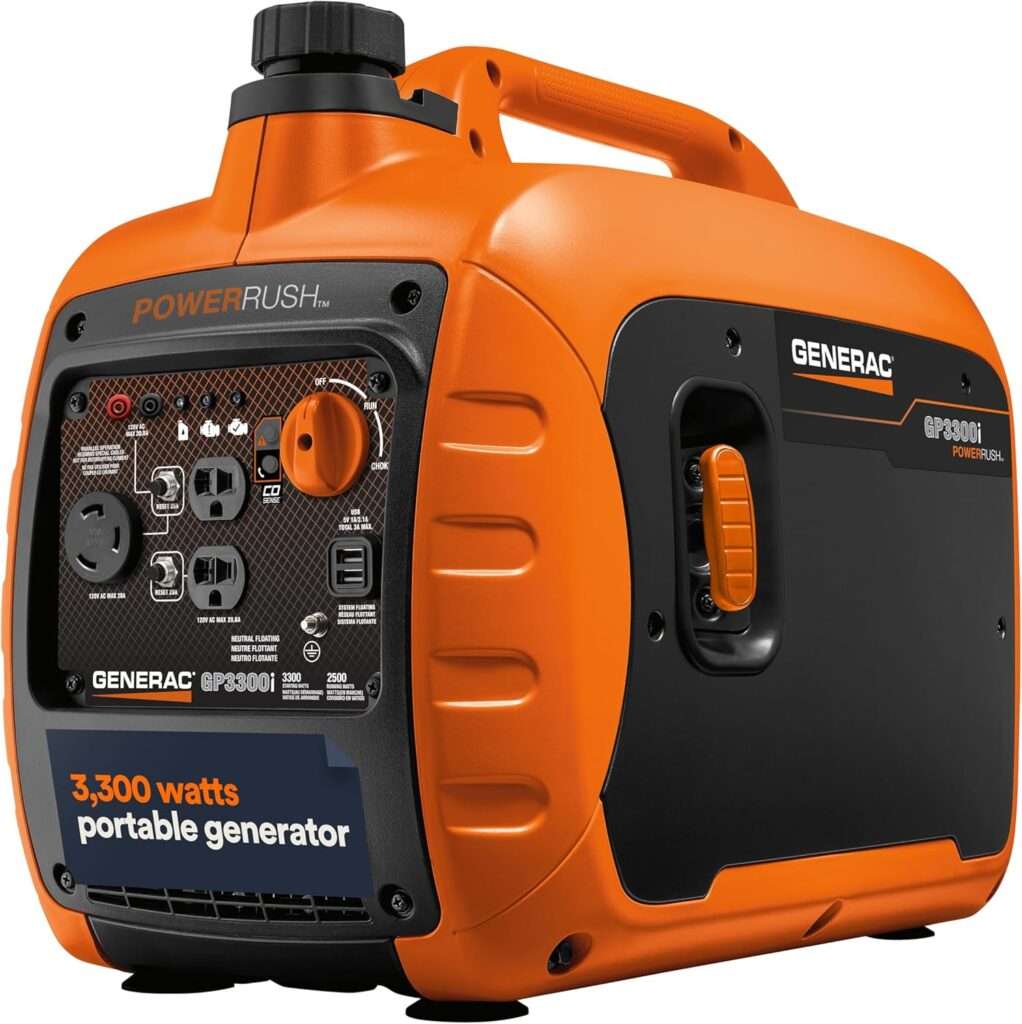
Quick Specifications
- Brand: Generac
- Starting Wattage: 3300 watts
- Running Wattage: 2500 watts
- Fuel Type: Gasoline
- Weight: 59.5 pounds
- Voltage: 120 Volts
- Dimensions: 22.3″L x 13.4″W x 18.4″H
- Fuel Tank Capacity: Not specified
If you need something that packs a punch for van life, the Generac GP3300i is a powerful and efficient option. From our standpoint, the PowerRush™ technology really stands out, giving it 50% more starting capacity, which helps with running motor-driven appliances smoothly. It’s built to handle heavier power loads, making it a practical choice for those needing more than just a basic backup generator. Even with its higher output, it still runs quietly, which is a huge plus when you don’t want to disturb your surroundings.
One thing we really like is how versatile and well-equipped it is. It has multiple outlets, including USB ports for small devices and a 30A twist-lock outlet for RVs. Furthermore, the COsense safety feature provides extra protection by automatically shutting off the generator if carbon monoxide levels rise too high. It’s not the lightest unit, but for the power and reliability it offers, the weight is understandable. From our perspective, it’s a solid option for those who want a strong and dependable generator without the excessive bulk of industrial models.
Appliance Compatibility & Estimated Runtime
Below are some of the appliances operated using the Generac 7153 GP3300i Portable Inverter Generator, along with their starting and running wattages.
| Appliance | Starting Wattage | Running Wattage | Estimated Runtime |
| Mini Fridge | 600W | 200W | 10-12 hours |
| Coffee Maker | 1000W | 800W | 3-4 hours |
| Microwave | 1000W | 1000W | 2-3 hours |
| Laptop & Phone | 0W | 100W | 15+ hours |
| LED Lights (Set) | 0W | 50W | 20+ hours |
| Small Heater | 1500W | 1300W | 45 min – 1 hour |
Pros
- High starting wattage with PowerRush technology for better handling of larger loads
- Quiet operation for its size, making it suitable for campgrounds and RVs
- COsense shutoff feature adds a layer of safety against carbon monoxide exposure
- Multiple outlet options, including USB ports and a 30A RV outlet
Cons
- Slightly heavier than smaller inverter generators, so moving it around may take effort
- No dual-fuel option, meaning you’re limited to gasoline only
From our standpoint, the Generac GP3300i is a strong and practical option for those who need more power without going for an overly bulky generator. The higher starting wattage, fuel efficiency, and quiet operation make it a well-balanced choice for van lifers and outdoor travelers who want something dependable. Furthermore, the COsense feature and multiple outlets add convenience and safety, making this generator a smart investment for those who rely on consistent power.
9. Handheld Solar Option: Jackery Portable Power Station Explorer 500

Quick Specifications
- Brand: Jackery
- Wattage: 500 watts
- Fuel Type: Non-gasoline (Solar Powered)
- Weight: 13.3 Pounds
- Voltage: 110 Volts
- Dimensions: 11.8″L x 7.6″W x 9.2″H
The open road, the starry nights, the thrill of waking up in a new location every morning. That’s van life for you. But even the most adventurous among us can’t deny the need for a bit of modern convenience. That’s where the Jackery Portable Power Station Explorer 500 steps in. This isn’t just another gadget; it’s our trusty sidekick on those long road trips. With its robust lithium-ion battery, it ensures our devices never run out of juice, even when we’re miles away from the nearest power source.
The Explorer 500 might pack a punch, but it’s as portable as they come. Imagine something no bigger than a basketball, yet powerful enough to keep our mini cooler humming and our phones charged. And the cherry on top? The pass-through charging. We can’t count the times we’ve been grateful for this feature, allowing us to charge the station while it powers our essentials. Jackery, you’ve truly outdone yourself with this one.
Pros
- Packs a long-lasting punch with its lithium-ion battery.
- Just the right size to power our adventures without weighing us down.
- Designed for the road with its compact and portable frame.
- The genius of pass-through charging – a lifesaver on those long trips.
Cons
- Relies on solar, so here’s hoping for sunny days.
- While it’s mighty, it might struggle with those power-hungry appliances.
The Jackery Explorer 500 isn’t just a power station; it’s our road trip buddy. It’s that reliable friend who’s always got our back, ensuring we’re powered up and ready for whatever the journey throws our way. Jackery’s Explorer 500 is the unsung hero of our van life adventures. It’s a combination of both power and portability, designed with the heart and soul of a traveler. Whether we’re capturing those breathtaking sunsets or just chilling with some tunes, with the Explorer 500, the adventure never stops.
10. Fuel Shutoff Option: WEN 2350-Watt Inverter Generator (56235i)

Quick Specifications
- Brand: WEN
- Wattage: 2350 watts
- Fuel Type: Gasoline
- Power Source: Gas Powered
- Weight: 39 Pounds
- Voltage: 120 Volts
- Dimensions: 17.3″L x 11.5″W x 17.5″H
In our opinion this is the top budget friendly option on our list. Van life is all about freedom, adventure, and, let’s be honest, a bit of comfort. And when it comes to powering those comforts, the WEN 56235i Super Quiet Portable Inverter Generator has quickly become our go-to. Weighing in at just 39 pounds, it’s a breeze to transport and store. But don’t let its lightweight frame fool you. This little powerhouse can churn out a solid 2350 watts, ensuring our devices stay charged and our camp stays lit.
What really caught our attention, though, was its whisper-quiet operation. We’ve been around generators that sound like they’re hosting a rock concert. Not this one. The WEN 56235i hums along, no louder than a casual chat, making it a perfect companion for those serene nights under the stars. And for the tech-savvy among us, the clean power output ensures our gadgets charge safely. Plus, the fuel shutoff feature is a neat touch, maximizing the generator’s lifespan by using up the remaining fuel before shutting down.
Pros
- Lightweight design makes it easy to transport and store.
- Quiet operation, no louder than a regular conversation.
- Clean power output, ensuring safe charging for sensitive electronics.
- Fuel shutoff feature to enhance the generator’s lifespan.
Cons
- Limited to gasoline, offering no alternative fuel options.
- Lacks advanced features like remote start or app integration found in some modern generators.
For us, the WEN 56235i stands out not just for its specs but for its thoughtful design. It’s a generator that understands the essence of van life – freedom, adventure, and a touch of home. Whether you’re parked by a serene lake or deep in the woods, with the WEN 56235i, you’re always powered up and ready for the next adventure.
Do I Need a Generator for Van Life with Campervan or RV?
You don’t have to use a generator for van life—but it makes off-grid living a lot easier. If you rely on power-hungry appliances, travel in unpredictable weather, or just like the idea of flipping a switch and getting electricity wherever you are, a generator is worth having.
Some setups run fine on solar alone—especially if your energy use is light and you’re chasing the sun. But if you’re using an induction cooktop, a portable AC, or even just working full-time from your van, solar might not cut it on cloudy days. That’s where a generator steps in. It fills the gaps when your batteries dip too low or when you need an extra push of power to run big items.
Having a generator also adds peace of mind. You won’t be stuck scrambling for shore power when the weather turns or your solar panels fall behind. It’s not about running everything 24/7—it’s about having options. For many van lifers, especially those on longer trips or full-time on the road, a generator isn’t a luxury. It’s a backup plan that keeps life running smoothly no matter where you park.
What Are the Different Types of Generators for Van Life with Campervan or RV?
Generators for van life come in several types, each designed for different power needs, noise limits, and travel styles. Understanding the differences helps you choose a generator that fits your campervan or RV setup without wasting space or fuel.
| Generator Type | Power Output Range | Noise Level | Fuel Type | Best Use Case |
| Inverter Generator | 1,000–3,000 watts | Low | Gasoline, Propane, Dual Fuel | Quiet camping, sensitive electronics, overnight use |
| Conventional Generator | 2,000–5,000+ watts | High | Gasoline, Diesel | High power demands, tools, short-duration use |
| Dual-Fuel Generator | 1,500–4,000 watts | Medium | Gasoline + Propane | Fuel flexibility during long trips |
| Solar Generator (Portable Power Station) | 300–3,000+ watts | Silent | Battery + Solar | Off-grid camping, low-noise areas |
| Diesel Generator | 3,000–8,000+ watts | Medium | Diesel | Large RVs, high continuous power needs |
| Built-In RV Generator | 4,000–12,000+ watts | Medium | Gasoline, Diesel, Propane | Full RV systems, air conditioners, heavy loads |
Portable vs. Built-In Generators for Van Life
Embarking on the van life journey brings with it a myriad of choices, and when it comes to power, the debate between portable and built-in generators is a lively one. Let’s chat about the trusty portable generators first. Picture this: you’re parked by a serene lake, and you decide to have a picnic a little distance away. With a portable generator, you can easily carry your power source with you. It’s like having a traveling companion that’s always up for an adventure. But, like all companions, they do need their own space in the van, and if not tucked away safely, might catch the wandering eye of a passerby.
Now, imagine the built-in generators as the heart of your van’s power system. They’re always there, humming away quietly, powering your life on wheels. There’s no lugging around; it’s a set-it-and-forget-it deal. But, just like any heart, it needs regular check-ups, and sometimes, reaching it for a quick fix can be a tad bit tricky.
So, what’s the verdict? Well, it’s like choosing between a backpack and a suitcase. Both have their moments and shine in different scenarios. It’s all about what feels right for your journey and how you envision your days on the road.
Standard vs. Inverter Generators for Van Life
The age-old debate in the van life community: standard or inverter generators? Let’s dive deep and unravel this mystery. At first glance, standard generators might seem like the old-school, reliable buddy you’ve always known. They’re straightforward, producing AC power directly from the fuel source. But here’s the catch: they can be a tad noisy. Imagine trying to enjoy a serene sunset, only to have the constant hum of your generator in the background. Moreover, they tend to run at a constant speed, regardless of the load, which might not be the most efficient way to use fuel.
Enter the inverter generators, the modern, sophisticated cousin. These beauties first produce AC power, which is then converted to DC and then inverted back to clean AC power. Sounds like a roundabout way? Perhaps, but this process ensures a consistent power curve, which is fantastic news for your sensitive electronics. Ever feared charging your laptop or smartphone directly from a generator? With inverter generators, that worry becomes a thing of the past. They adjust their speed based on the load, making them more fuel-efficient. And as a cherry on top, they’re generally quieter, allowing you to enjoy the tranquility of your surroundings.
In the grand tapestry of van life, both have their place. But if you’re leaning towards a quieter, more efficient option that’s kind to your gadgets, the inverter generator might just be your new best friend on the road.
How to Choose the Best Generators for Camper Van Life
Choosing the right generator for camper van life means finding the balance between power, noise, size, and efficiency. The right choice keeps your essentials running without taking up valuable space or creating unnecessary fuel and noise issues.
Power Output and Wattage Needs
Power output determines which appliances you can run at once. Most camper vans do well with generators in the 1,000 to 2,000 watt range, which covers lights, devices, fans, and small cooking appliances without oversizing.
Fuel Type and Flexibility
Fuel type affects convenience and availability. Gasoline generators are easy to refuel, propane runs cleaner, and dual-fuel models offer backup options when fuel access is limited.
Noise Level
Noise level matters for comfort and campground use. Quiet inverter generators under 60 decibels are far more suitable for overnight stays and shared camping areas.
Inverter Technology
Inverter generators provide clean, stable power for electronics. They are more efficient and compact, making them a better fit for van life than conventional generators.
Portability and Size
Weight and size affect daily usability. Compact generators under 50 pounds are easier to store, move, and secure inside a van.
Fuel Efficiency and Runtime
Runtime determines how often you need to refuel. Efficient generators that run 6 to 10 hours at low load are ideal for extended stays.
Solar and Battery Compatibility
Generator compatibility with solar and battery systems improves flexibility. Generators work best as backup power for charging batteries during cloudy or high-demand periods.
Build Quality
Durable construction ensures reliability on rough roads and in changing weather. Solid housings and quality engines handle long-term travel better.
Final Words!
Van life looks different for everyone. Some park by lakes, some head for the hills, and others chase Wi-Fi. But no matter where you end up, you still need power.
That’s what a generator brings to the table—quiet reliability. This lets you make coffee when it’s still dark out. It powers your laptop so you can get work done from the middle of nowhere. Moreover, it keeps the fridge running, the lights on, and your batteries charged.
Solar is part of the picture too. Pairing a small generator with a good solar setup gives you flexibility—less noise, less fuel, and fewer worries about running out of power.
At the end of the day, your generator isn’t just a machine. It’s part of your setup. It keeps your routine going, even when you’re miles from the nearest plug.
Pick one that fits your travel style. Not just the wattage, but how you live. Because when you’re off-grid, comfort comes from the small things working right—quiet mornings, hot meals, and power when you need it.
Related FAQs
What is the right type of generator for van life?
The right type depends on individual needs, but inverter generators are popular due to their efficiency and quiet operation.
How do I determine the right size generator for my van?
Calculate your power needs based on the appliances you’ll use, considering both starting/surge watts and running/continuous watts.
Are solar generators suitable for van life?
Yes, solar generators are eco-friendly and perfect for sunny locations but depend on weather conditions for efficiency.
How often should I maintain my generator?
Regular maintenance, such as checking oil and cleaning, is recommended every few months or as per the manufacturer’s guidelines.
Can I run my generator while driving?
While some van lifers do, it’s essential to ensure it’s securely mounted and well-ventilated.
Is it safe to use a generator inside my van?
No, generators should be placed outside to prevent carbon monoxide poisoning and ensure proper ventilation.
How long can a generator run continuously?
It varies by model, but most can run for several hours. Always check the manufacturer’s recommendations.
What’s the difference between standard and inverter generators?
Inverter generators are generally quieter, more efficient, and better for sensitive electronics compared to standard generators.
Can I use a generator in rainy or wet conditions?
It’s risky. Water can damage the generator or cause electrocution. Always use in a dry, well-ventilated area.
Why is my generator so noisy, and can I make it quieter?
Noise levels vary by model. Using a generator enclosure or positioning it on a soft surface can reduce noise.

Jack Rivers is a long-time RVer, a husband, and a dad who’s traveled solo and now with his family. He’s learned a lot from years on the road, sometimes the hard way. From quiet mornings parked by the woods to messy evenings with the kids and a busted heater, he’s been through it all. Miles writes to share the real stuff, the small wins, and the lessons that make RV life worth it, no matter who you’re traveling with.
